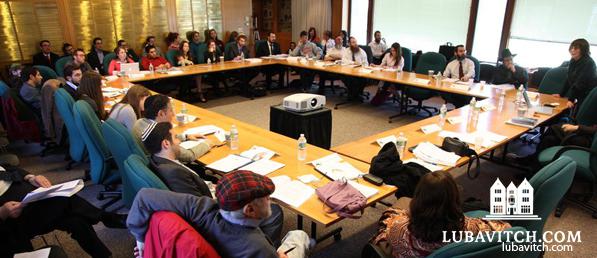(lubavitch.com) Is it rational to believe in the historical accuracy and divine origin of the Bible? Can Jews exist as a community without a land of their own? Is the traditional role of women in Judaism an affront to feminism?
These were some of the questions Jewish students explored and debated this past Sunday-Monday, at the 2nd Annual Sinai Scholars Symposium, hosted at Dartmouth’s Nelson A. Rockefeller Center.
Titled “Ancient Ethics in a Postmodern World,” the Symposium drew students from UPENN, Dartmouth, NYU, University of Miami, Cornell, UCLA, Brandeis, Boston U, and the University of Arizona, and offered students an unusual setting for interacting with professors and Jewish students from diverse disciplines and schools.
Together students grappled with a range of issues facing the thinking Jew in a post-modern world, such as Zionism and Jewish Identity, dating and relationships, and Jewish responses to science and technology.
Rabbi Dr. Emmanuel J. Schochet, professor emeritus at Humber College, opened the Symposium with a lecture on epistemological methodology as it relates to defining religious truth. Rejecting the notion of a provable empirical truth, Schochet argued that consistency is the closest concept humans have to absolute truth.
Brandon Floch, a junior at Dartmouth College, sparked a heated debate about biblical criticism when he raised the subject of subscribing to an observant Jewish lifestyle and performing mitzvot without accepting the divine origin of the Torah.
Andrew Aidman, a recent graduate of the University of Miami, spoke about a kabbalistic approach to entrepreneurism, Aidman demonstrated how the mystical concepts of unity and the pursuit of a higher form of pleasure could serve a paradigm for economic growth.
According to Rabbi Yitzchok Dubov, Director of Sinai Scholars, the Symposium offers a unique opportunity for students to “connect to 3000 years of Jewish scholarship through academic explorations of Torah study.” It is specifically through learning and engaging with Jewish texts and ideas, says Dubov, that young Jews develop a strong sense of identity and commitment.
The Sinai Scholars Society is a joint program of the Rohr Jewish Learning Institute and Chabad-on-Campus. Students are admitted by application process to the program’s intensive, semester-long Jewish study programs that offer in-depth Jewish study and follow-up opportunities like this conference. Some 1500 Jewish students at 52 participating Chabad campus centers in North America are part of the Society.
Mr. George Rohr, the principal patron of Chabad-on-Campus and Sinai Scholars, met with the students, and encouraged them to maximize their individual potential. “Don’t suffice with baking bread when you are capable of polishing diamonds,” he told them, citing Hayom Yom, a book of daily thoughts from the Lubavitcher Rebbe.
Asked what motivates him to donate so generously to Sinai Scholars, Mr. Rohr responded humbly. “I’m not a philanthropist,” he said. “I’m an investor and I know of no more valuable a cause in which to invest. It simply gives me the best return on my money.”
Rabbi Moshe Gray, co-director of Chabad at Dartmouth College, was thrilled to host what he called “the most exciting program that Chabad-on-Campus offers.”
“It is really inspiring to see the passion that the students have for Torah learning and to see them interact with some of the eminent academic minds in the Jewish world today. I think the goal of the Symposium is to inspire students to continue in their academic pursuit of Torah study and I am honored that I was chosen to host this.”
Many students spoke highly of the program as well. Zachardy Bodner, a UPenn senior majoring in cognitive sciences, told lubavitch.com that the Symposium was “one of the most amazing experiences” of his college career. “I learned a lot of new ideas in Jewish philosophy that are pertinent to what I have been thinking about lately.”
The winning paper was delivered by Zachary Klein, a senior majoring in music composition with piano emphasis at Ithaca College. Klein’s paper compared prayer to music and art, focusing specifically on the interplay between performer and audience.
The Symposium drew others, like Melissa Garber, who are no longer in the university setting. A Dartmouth alumna, Garber enjoyed the chance to engage with Jewish ideas in an academic environment. “Being outside of college, something that I miss the most is the academic environment where you can talk about things that are academically stimulating as well as Jewishly motivated. I went to last year’s symposium in Princeton and I loved it so much I absolutely had to come back again this year. I can’t wait to come again next year.”
By encouraging open, honest discussions on a range of issues, the symposium, says Rabbi Dubov, helps foster a sense of “deep appreciation, warmth and passion toward Jewish learning and living.”
Bodner, for one, is thankful that the Symposium gave him the opportunity to engage in dialogue with other students, and showed him “that there are others my age out there with Jewish experiences vastly different to my own who think about Jewish philosophy in a similar intense manner as myself.” For him, “this discovery was extremely meaningful.”
Photos by B. Lifshitz

Be the first to write a comment.